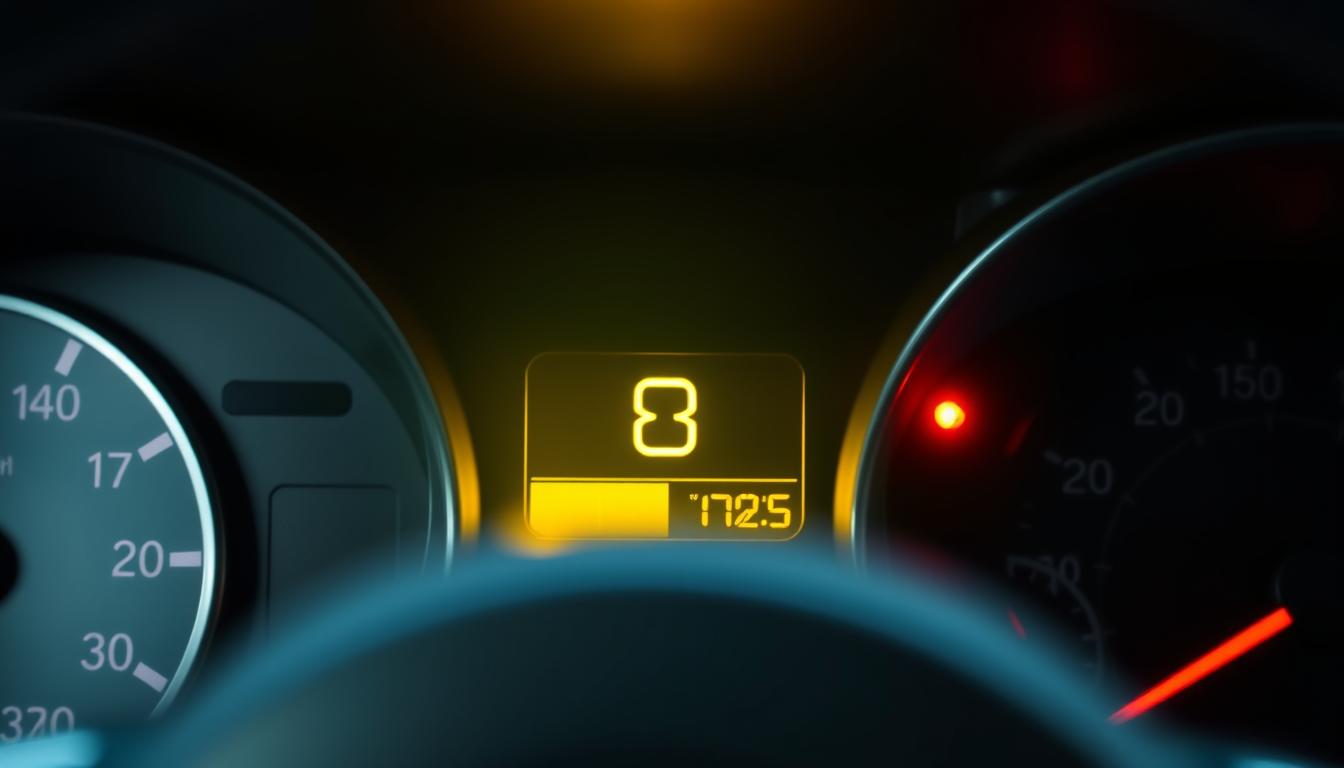When your check engine light starts flashing and your car shakes, it’s a big warning. This means your engine might be misfiring. This is a serious problem that needs quick fixing to avoid more damage.
Engine misfires often happen because of ignition system problems. This can be due to old spark plugs or faulty ignition coils. These issues stop the engine from working right, causing it to shake and the check engine light to flash. If you keep driving, you could damage your engine, catalytic converter, and other parts.
Key Takeaways
- A flashing check engine light combined with car shaking usually signifies an engine misfire.
- Faulty spark plugs or ignition coils are common culprits behind engine misfires.
- Driving with a flashing check engine light can lead to serious and costly engine damage.
- Addressing the issue promptly is crucial to prevent further deterioration of your vehicle’s performance.
- Seeking professional assistance or using DIY troubleshooting techniques can help identify and resolve the underlying problem.
Understanding the Check Engine Light
The check engine light is a key warning in your car’s system. If it starts flashing, it means you have a serious issue that needs quick action. An engine misfire is a common cause for this light to flash.
What Does a Flashing Check Engine Light Mean?
A flashing check engine light shows a major engine problem. It often means there’s an engine misfire. This can cause serious damage if not fixed right away.
The diagnostic system has found a problem. It could harm the catalytic converter, a vital part of the exhaust system.
Common Causes for the Light to Flash
- Worn or malfunctioning spark plugs
- Faulty ignition coils
- Intake manifold gasket issues
- Problems with the fuel injection system
- Damaged or deteriorating engine sensors
When Should You Worry?
If the check engine light stays on, it means you have a problem to fix. But it’s not an emergency. Yet, a flashing light is a serious warning.
Driving with a flashing light can damage your engine and other parts. It’s important to get it checked and fixed by a pro as soon as you can.
“Ignoring a flashing check engine light can result in costly repairs and potentially endanger your vehicle’s safety.”
The diagnostic system alerts you to engine problems. By paying attention to a flashing light, you can avoid bigger and more expensive issues later.
Symptoms of Car Shaking
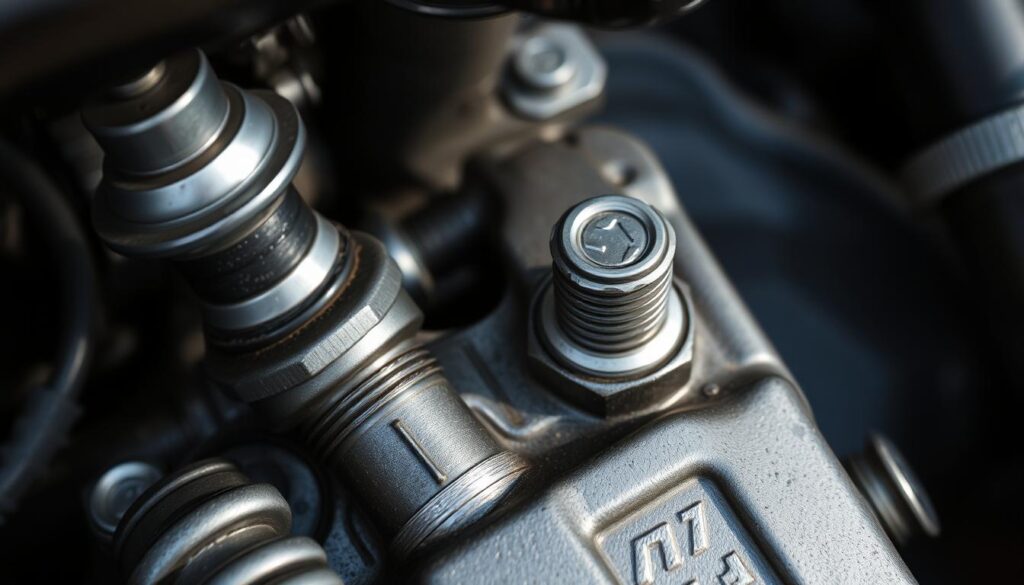
When your check engine light starts flashing, it’s often accompanied by an unsettling sensation – your car shaking while driving. This physical vibration is a clear sign that something is amiss under the hood. It usually relates to engine misfires.
A misfire occurs when one or more engine cylinders fail to ignite the air-fuel mixture properly. This leads to an uneven power output and the characteristic engine vibration.
Typical Causes of Shaking While Driving
The most common culprits behind a shaking, rough-running engine are:
- Worn spark plugs – These crucial ignition components can deteriorate over time, preventing efficient combustion and causing misfires.
- Faulty ignition coils – When an ignition coil fails, it disrupts the spark delivery to the corresponding cylinder, resulting in a misfire.
- Fuel system issues – Problems with fuel injectors, fuel pumps, or the fuel line can lead to an improper air-fuel mixture, contributing to engine vibration.
Differentiating Between Small Vibrations and Major Issues
It’s important to distinguish between minor vibrations, which may be caused by rough road conditions, and more severe shaking that signals deeper problems. Pronounced, consistent shaking, when coupled with a flashing check engine light, indicates a serious engine issue that requires prompt attention. Driving with a severely misfiring engine can exacerbate the problem and lead to further damage, so it’s best to have the issue diagnosed and addressed as soon as possible.
“Driving with the car shaking and check engine light on can lead to more damaged components and costly problems that could have been avoided with prompt repair.”
The Importance of Diagnostic Trouble Codes (DTCs)
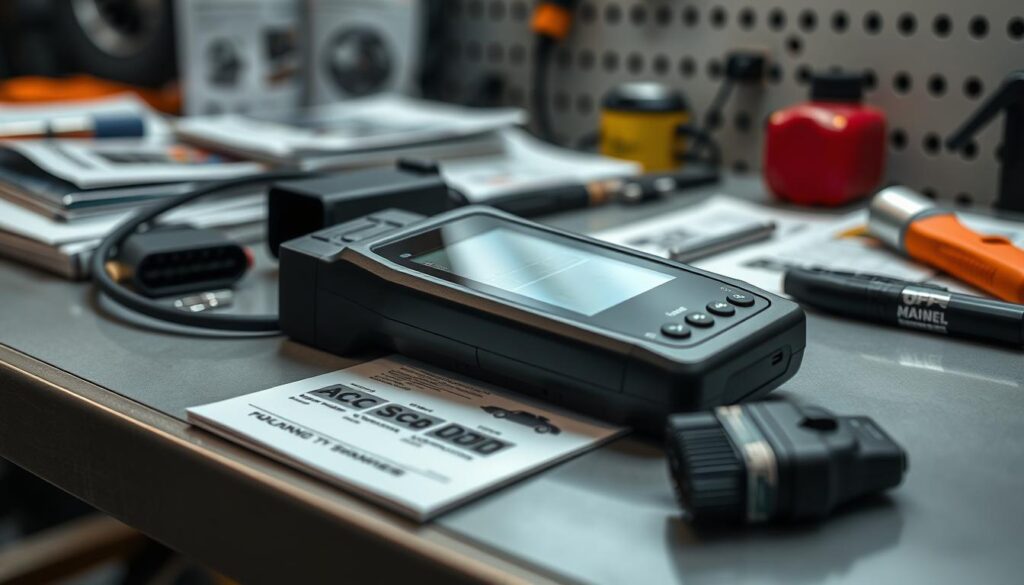
Diagnosing engine problems can be tough, but DTCs make it easier. These codes are stored in a car’s computer when issues arise. They give crucial clues about the problem. By using an OBD-II scanner, you can understand the issue better. This helps in fixing the problem more effectively.
How DTCs Help Identify Problems
Each DTC points to a specific problem in the vehicle. For instance, code P0303 means there’s an issue with cylinder 3. Knowing these codes helps mechanics and DIY fans find the exact problem. This saves time and money on unnecessary checks.
Tools Needed to Read DTCs
- An OBD-II scanner is key for reading DTCs. These devices are affordable and give you important info. They’re much cheaper than professional tools.
- Basic OBD-II scanners can read DTCs. But, advanced engine diagnostics tools offer more detailed analysis. They help understand the vehicle’s systems better.
- Decoding DTCs often needs expert knowledge. Some codes point to complex issues that only pros can fix.
Understanding DTCs and using the right tools helps keep your car in good shape. It also lets you fix problems early, before they get worse.
Possible Mechanical Issues
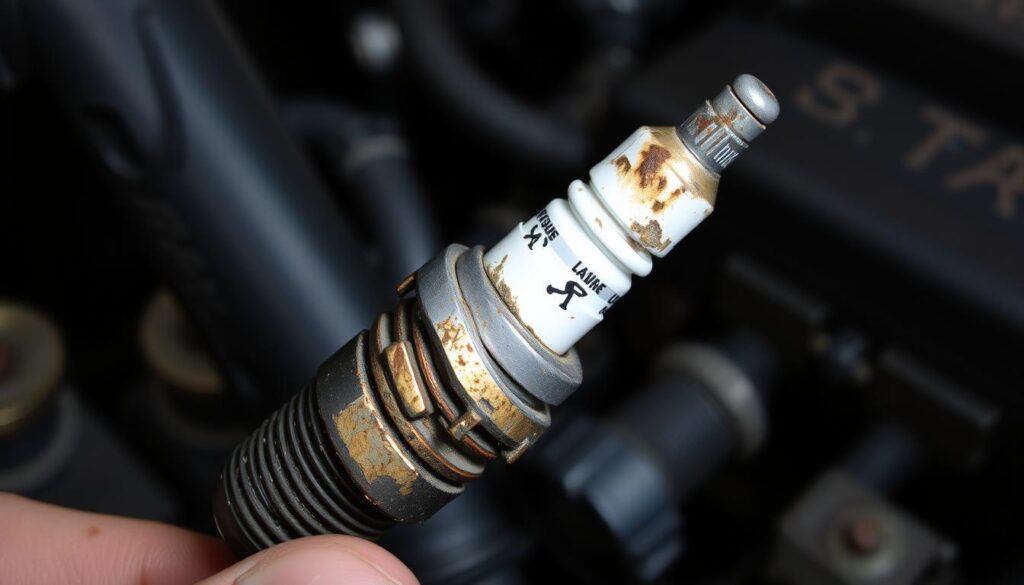
When your check engine light flashes and your car shakes, it usually means there’s a mechanical problem. Engine misfires are a common cause. If ignored, they can lead to serious issues.
Engine Misfires and Their Consequences
Engine misfires happen when cylinders don’t ignite the fuel-air mix right. This disrupts the engine’s smooth running. It can cause a rough idle, less power, and more emissions.
Misfires often stem from faulty spark plugs or bad ignition coils. These parts are key for sparking the fuel.
Problems with Spark Plugs and Ignition Coils
Spark plugs wear out over time, leading to misfires. Ignition coils, which spark the plugs, can also fail. Fixing these faulty spark plugs and bad ignition coils is vital for engine health.
Fuel System Issues That Cause Shaking
Fuel system issues can also cause engine shaking and a flashing check engine light. Problems like clogged fuel injectors or low fuel pressure can upset the air-fuel mix. This leads to misfires and shaking.
Fixing these mechanical problems is key to your car’s performance. It also solves the check engine light and shaking issues.
| Symptom | Potential Cause |
|---|---|
| Engine Misfiring | Faulty spark plugs, bad ignition coils |
| Rough Idle | Fuel system issues (clogged injectors, low pressure) |
| Loss of Power | Ignition system problems, fuel system problems |
| Increased Emissions | Misfiring cylinders, catalytic converter damage |
Transmission and Drivetrain Problems
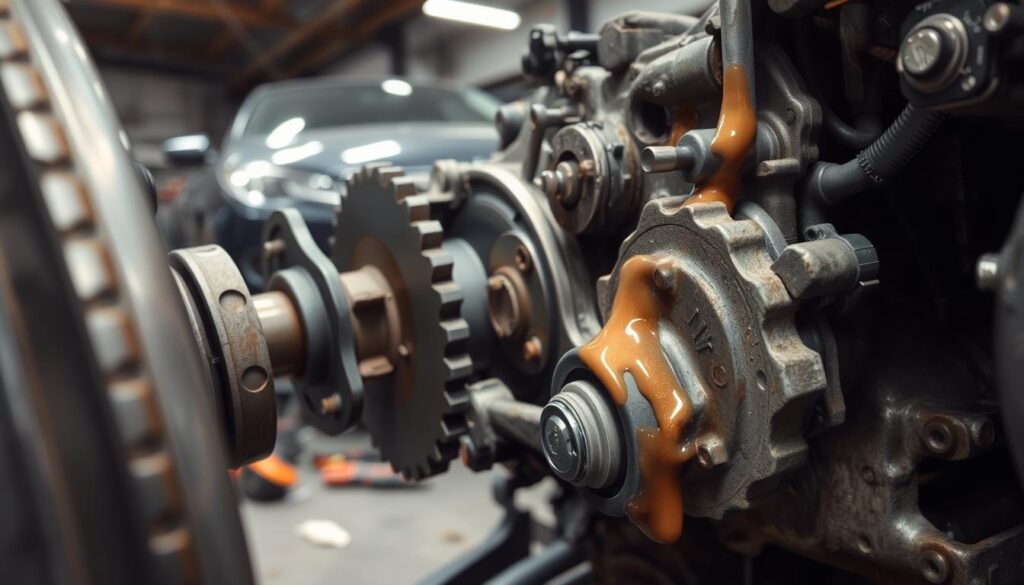
Your car’s transmission and drivetrain are key parts that can cause shaking and a check engine light. Knowing the signs of transmission trouble and how a failing drivetrain affects your car is important. This helps you find the main problem.
Signs of Transmission Issues
Difficulty shifting gears is a common sign of transmission trouble. This can be true for both manual and automatic transmissions. You might notice the transmission slipping, causing the car to hesitate or rev up before shifting.
Unusual noises, like whining or grinding, during acceleration are also signs. These sounds can mean there’s a problem with the transmission.
How a Failing Drivetrain Can Affect Performance
The drivetrain, including CV joints and driveshafts, is vital for power transfer from the engine to the wheels. When these parts wear out or fail, vibrations and a drop in performance can happen. Shaking, often during acceleration or at certain speeds, might indicate a drivetrain issue.
Fixing transmission and drivetrain problems is more complex than engine issues. You need the right tools and knowledge to find and fix the problem. Ignoring these issues can cause more damage and even lead to a costly transmission failure.
| Common Transmission Problems | Potential Drivetrain Issues |
|---|---|
|
|
Fixing transmission and drivetrain problems quickly is key to keeping your car running well. If you notice shaking or other issues, get your car checked by a skilled mechanic. They can find the cause and suggest the right fix.
Electrical System Failures
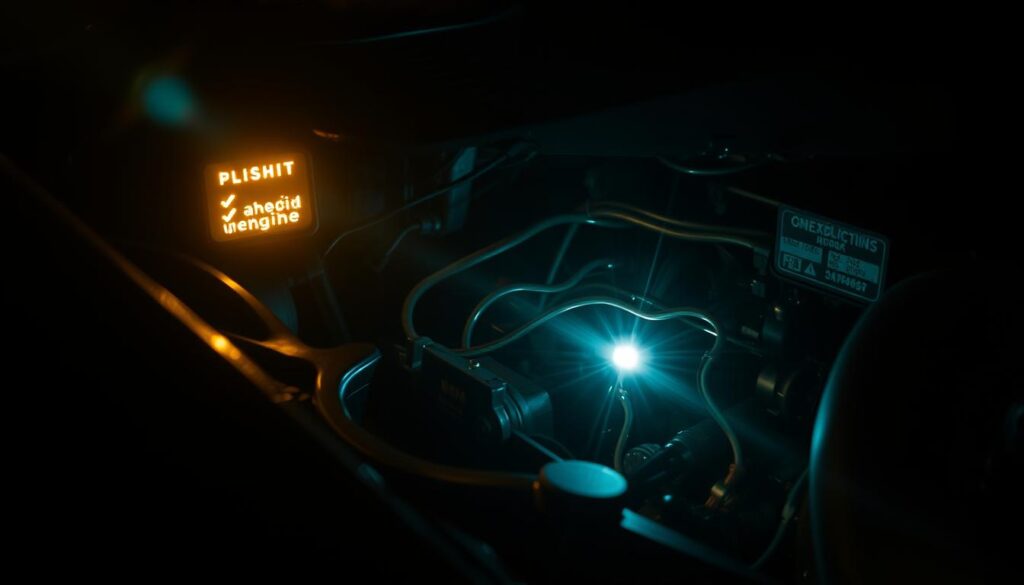
Electrical system failures can make the check engine light come on. They also cause problems like a shaking vehicle. The battery and alternator are key parts of this system.
The Role of the Battery and Alternator
A weak battery can cause power issues, affecting the engine. This might make your vehicle shake. The alternator keeps the battery charged and powers the vehicle’s systems. If it fails, the check engine light will turn on.
Faulty Sensors Leading to Check Engine Light Activation
Bad sensors, like the mass airflow or oxygen sensor, can also cause problems. They send important data to the engine control unit. If they fail, the engine might not work right, leading to shaking.
Regular checks and replacing old parts are key. This helps avoid electrical system failures. Fixing these issues keeps your vehicle running smoothly and prevents the check engine light from flashing.
| Electrical System Issues | Potential Causes | Symptoms |
|---|---|---|
| Battery Issues | Weak or failing battery | Inconsistent power supply, engine performance issues, vehicle shaking |
| Alternator Problems | Malfunctioning alternator | Inability to maintain proper voltage, electrical system failures, check engine light activation |
| Faulty Sensors | Malfunctioning mass airflow sensor, oxygen sensor | Incorrect data to ECU, poor engine performance, check engine light activation, vehicle shaking |
Knowing how the battery, alternator, and sensors work helps you fix problems. This way, you can stop your check engine light from flashing and your vehicle from shaking.
When to Seek Professional Help
When you see a check engine light flashing and your car shakes, get help from a professional mechanic. These signs point to serious issues that need quick attention. This can stop more damage and save you from expensive fixes.
Signs Indicating Immediate Attention is Needed
Severe vibrations, sudden power loss, odd noises, or smoke from your car mean you need a mechanic fast. Driving like this can cause bigger and pricier repairs.
Cost Considerations for Repairs
The cost to fix your car can vary. But fixing it quickly can save you money later. Mechanics have the skills and tools to find and fix complex engine problems. This can help you avoid spending a lot more.
| Repair Scenario | Average Cost |
|---|---|
| Malfunctioning cylinder | $500 – $800 |
| Faulty spark plugs or ignition coils | $200 – $400 |
| Intake manifold gasket replacement | $300 – $500 |
| Broken engine mounts | $400 – $600 |
Getting professional help when your check engine light flashes and your car shakes can save you money. It prevents more costly repairs later on.
DIY Troubleshooting Techniques
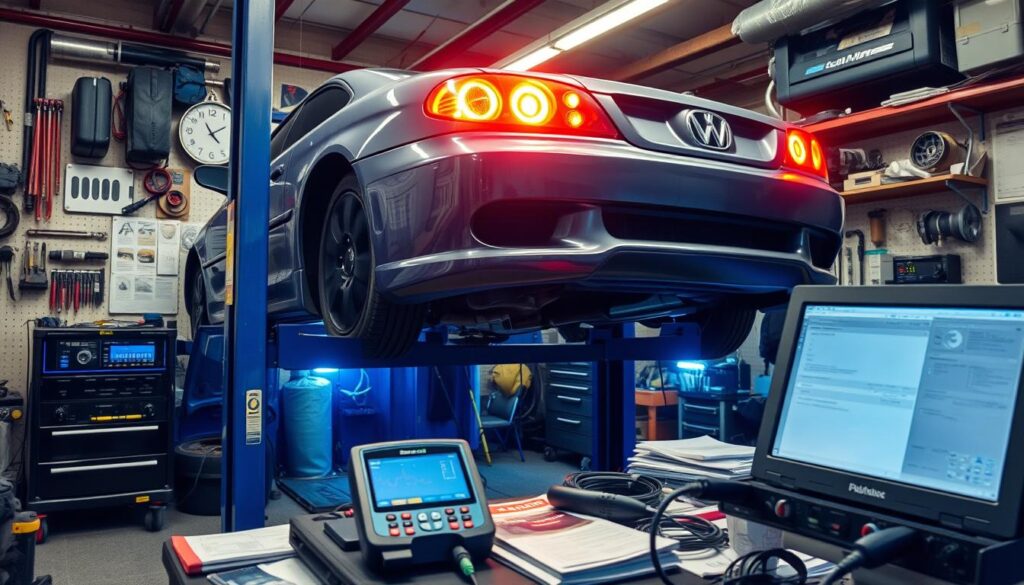
Before you take your car to the mechanic, try some simple checks at home. These basic vehicle checks can spot easy problems. They might even save you money on repairs.
Basic Checks Before Visiting a Mechanic
Start with the gas cap. A loose or damaged cap can cause the check engine light to come on. Make sure it’s tight and not cracked.
Next, check your vehicle’s fluid levels. Look at the oil, coolant, and transmission fluid. If they’re low or dirty, it could cause your engine to misfire and shake.
Assessing Fluid Levels and Conditions
Use your owner’s manual to learn how to check fluid levels and conditions. If you find any low or dirty fluids, a mechanic should look at it. They can find the real problem.
While DIY checks are useful, don’t ignore flashing lights or severe shaking. These signs often mean serious issues. It’s best to get a mechanic’s help to avoid more damage and stay safe.
Preventative Maintenance Tips
Keeping up with preventative maintenance is key to avoiding expensive engine problems. It helps keep your vehicle in top shape. Regularly follow the manufacturer’s service schedule. This includes oil changes every 5-6 months, air filter replacements, and annual inspections.
Regular Inspection to Avoid Future Issues
Regular inspections can catch problems early. This helps avoid bigger issues later. Check fluid levels, listen for unusual sounds, and watch for warning lights. These steps can save you from costly repairs.
Keeping Your Vehicle in Optimal Condition
Proper maintenance is essential. Replace worn spark plugs and fix fuel system issues. Make sure the cooling system works right. This keeps your vehicle running well and prevents the check engine light from coming on. A proactive approach to care saves time, money, and stress.
FAQ
What does a flashing check engine light indicate?
What can cause car shaking along with a flashing check engine light?
How can diagnostic trouble codes (DTCs) help identify the problem?
What are some common mechanical issues that can cause shaking and a flashing check engine light?
Can transmission or drivetrain problems also cause shaking and a check engine light?
How can electrical system failures contribute to shaking and a check engine light?
When should I seek professional help for a flashing check engine light and car shaking?
What basic DIY checks can I perform before seeking professional help?
How can regular preventative maintenance help avoid serious engine problems?

Jack Thompson is a writer and seasoned auto mechanic with over 15 years of experience in the automotive industry. Known for his expertise in vehicle mechanics, Jack has a deep understanding of car and truck systems. His skills, honed through years of hands-on experience, have made him a trusted name in the field. Jack is committed to providing valuable insights into car maintenance and repair, helping vehicle owners keep their vehicles in top condition.

